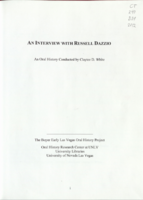Search the Special Collections and Archives Portal
Search Results

Transcript of interview with Russell Dazzio by Claytee D. White, November 4, 2013
Date
Archival Collection
Description
Text
Barbara Agonia oral history interviews
Identifier
Abstract
Oral history interviews with Barbara Agonia conducted by Suzanne Becker on September 17, 2007, September 25, 2007, and October 02, 2007 for the Women's Research Institute of Nevada (WRIN) Las Vegas Women Oral History Project. Agonia's interviews begin with an overview of her early life, including her education and study abroad experiences in England during college. During the interview Agonia also discusses attending the University of Nevada, Las Vegas in the 1950s for graduate school. Agonia talks about her community activism with Soroptimist International of Las Vegas, Friends of the Nevada Wildnerness, and Clark County Community College. Lastly, Agonia discusses advocacy initiatives for Great Basin National Park and rape crisis education.
Archival Collection

Transcript of interview with Mike Gausling by David G. Schwartz, December 7, 2016
Date
Archival Collection
Description
Text
Roberta Sabbath oral history interview
Identifier
Abstract
Oral history interview with Roberta Sabbath conducted by Barbara Tabach on April 27, 2015 for the Southern Nevada Jewish Heritage Project. Sabbath discusses moving to Las Vegas, Nevada in the late 1960s, her involvement with organizing University of Nevada, Las Vegas’ (UNLV) Hillel chapter, and the Hebrew Day School. She also talks about her husband’s, Dennis Sabbath, career as a union attorney, and her career as an UNLV literature professor.
Archival Collection
Ron Lurie oral history interview
Identifier
Abstract
Oral history interview with Ron Lurie conducted by Stefani Evans and Claytee D. White on October 17, 2016 and November 10, 2016 for the Building Las Vegas Oral History Project. In the first interview, Lurie discusses his upbringing in Los Angeles, California and moving to Las Vegas, Nevada in 1953. He recalls his father’s business, Market Town, graduating from Las Vegas High School, and becoming manager for three Wonder World convenient stores. Lurie talks about his campaign to become Mayor of Las Vegas, running for Las Vegas City Council, and the redevelopment of Downtown Las Vegas. In the second interview, Lurie discusses the Las Vegas Downtown Progress Association, the National League of Cities, and the Las Vegas monorail. Lastly, Lurie talks about employee longevity and unionization.
Archival Collection
Julia Payne oral history interviews
Identifier
Abstract
Oral history interviews with Julia Payne conducted by Claytee D. White on February 11, 2004 and March 07, 2004 for the Boyer Early Las Vegas Oral History Project. In the first interview, Payne discusses arriving to Las Vegas, Nevada in 1961. She describes discrimination, redlining on the Westside, and recalls the lack of integration at the time. Payne then discusses Jackson Street and compares it to the Las Vegas Strip. Lastly, Payne talks about Cove Hotel, Hank’s Place, Colony Club, and the decline in African American businesses on Jackson Street. In the second interview, Payne discusses welfare rights, changes to the Westside and growth of suburban areas. She describes her employment with the Southern Nevada Drug Abuse Council and becoming the first African American substance abuse counselor. Lastly, Payne discusses her position as Executive Director of Nevada Treatment Center.
Archival Collection
Joan Swift oral history interviews
Identifier
Abstract
Oral history interviews with Joan Swift conducted by Sue Peterson on March 18, 2004, March 25, 2004, and June 22, 2004 for the Boyer Early Las Vegas Oral History Project. In this interview, Swift discusses life in Las Vegas, Nevada during the 1940s and 1950s. Swift begins the interview by describing her upbringing in the Basic townsite and Boulder City, Nevada, attending Basic High School, and life in Southern Nevada during World War II. She then discusses working in the Clark County Recorder's office, explaining her job duties and what function the office served for the county. Swift continues, talking about recreation activities at the time, including visiting the casinos on the Las Vegas Strip and the Helldorado Parades. Swift discusses nuclear weapons testing at the Nevada Test Site and her career as the Clark County recorder. Lastly, she describes her thoughts on the future of Las Vegas, Nevada.
Archival Collection
Marie Jordan oral history interview
Identifier
Abstract
Oral history interview with Marie Jordan conducted by Danny Budak on March 20, 1978 for the Ralph Roske Oral History Project on Early Las Vegas. Jordan discusses her personal perspective of life in Nevada, being a local resident for twenty years, family life, and changes that she has witnessed in the Las Vegas, Nevada Valley.
Archival Collection

Transcript of interview with Buddy Frank by David G. Schwartz, January 3, 2017
Date
Archival Collection
Description
Text
Mary Wesley oral history interview
Identifier
Abstract
Oral history interview with Mary Wesley conducted by Claytee D. White on October 22, 2007 for the UNLV University Libraries Oral History Collection. In this interview, Wesley discusses her early life in Quitman, Mississippi. She recalls the racism she experienced during her youth, the church community in Quitman, and traveling to Las Vegas, Nevada by train. She talks about the welfare rights movement in Las Vegas, Operation Life, and businesses on Jackson Street. Lastly, Wesley describes the entertainment on the Westside, and integration on the Las Vegas Strip.
Archival Collection
